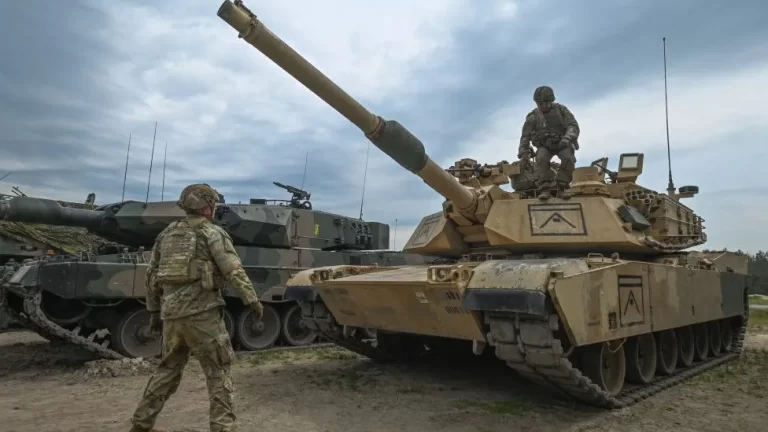US weapons sales overseas rose sharply last year, reaching a record total of $238bn (£187bn), as Russia's invasion of Ukraine stoked demand.
The US government directly negotiated $81bn in sales, a 56% increase from 2022, the state department reported. The rest were direct sales by US defence companies to foreign nations.
Ukraine's neighbour Poland, currently on a drive to expand its military, made some of the biggest purchases.
Poland bought Apache helicopters for $12bn, and also paid $10bn for High Mobility Artillery Rocket Systems (Himars) and $3.75bn for M1A1 Abrams tanks, the department said in a report for the US government's fiscal year that ended in October.
It also spent $4bn on Integrated Air and Missile Defence Battle Command Systems. Prime Minister Donald Tusk has vowed to continue the previous conservative government's military modernisation programme, which aimed to make Poland “the most powerful land force in Europe”.
Germany, meanwhile, spent $8.5bn spent on Chinook helicopters. Bulgaria paid $1.5bn for Stryker armoured vehicles and Norway bought $1bn worth of multi-mission helicopters. The Czech Republic bought $5.6bn in F-35 jets and munitions.
“Arms transfers and defence trade are important US foreign policy tools with potential long-term implications for regional and global security,” the state department said in its annual memo released on Monday.
Sales were also boosted by countries turning away from Russia, which has been the second largest seller of weapons after the US for decades, according to the head of the department's arms transfers office.
“The Russian defence industry is failing and continues to fail,” said Mira Resnick told Politico, adding that Russian weapons manufacturers are being “denied the resources that come from exports”, such as cash.
President Joe Biden's administration has argued that American support to Ukraine boosts the domestic economy through arms sales. Still, US lawmakers look increasingly willing to end direct support to Ukraine, with many Republicans pushing for assistance to be tied to an overhaul of US immigration policy.
One Wednesday, Nato Secretary General Jens Stoltenberg will visit a Lockheed Martin missile facility in Alabama, hoping to underscore the importance of the US defence industry to the alliance.
Outside of Europe, the weapons report showed that South Korea paid $5bn for F-35 jets and Australia spent $6.3bn on C130J-30 Super Hercules planes. Japan reached a $1bn deal for an E-2D Hawkeye surveillance plane.
— CutC by bbc.com


